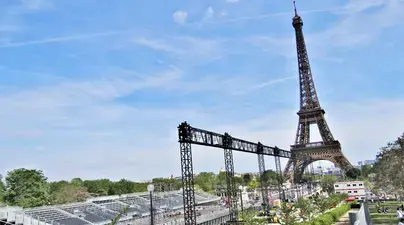How can the world’s biggest sporting event host thousands of athletes and millions of international fans while keeping its promises to promote equity and sustainability?
“Paying attention to how the 2024 Paris Olympics will maintain their responsibility to the 2015 Paris Agreement and their promise to combating climate change is a crucial component of sustainability within construction administration,” says John Parkinson, program director and lecturer in discipline at the M.S. in Construction Administration program at Columbia University School of Professional Studies (SPS).
“Sustainability is something discussed at length within our program, especially in the capstone course. It’s important to understand the life cycle of an asset and its carbon footprint when approaching any Olympics-sized project.”
In their ambitious Paris Olympics 2024 Legacy Plan, the Paris 2024 organizing committee details the "target carbon footprint" model they are utilizing to both manage and control greenhouse gas emissions from the start of the event's planning—marking the first time a Games committee has set a carbon budget before the event has commenced.
Unlike past practices, this method sets a carbon budget, aiming to reduce CO2 emissions to 1.5 million tonnes, down from the usual 3.6 million tonnes. This reduction is achieved through using existing or temporary infrastructure and implementing a comprehensive emissions reduction plan.
Sustainability and equity are major factors in the construction of Olympic villages and throughout large temporary structures, including professional golf tournaments, FIFA, and the World Cup, says Partho Dutta, lecturer in the Construction Administration program and project designer at Populous.
“In my Introduction to Sports Stadiums course, students are given the opportunity to develop their own stadium,” Dutta says. “The course goes into the programming of stadium development, and we often tour local stadiums, including Madison Square Garden, Yankee Stadium, UBS Arena, and others. The students develop their own stadium projects, present them, find sponsors, raise money, find a design team, and figure out the cost. It gives them a good idea of how to develop a large-scale project, not dissimilar to Olympic villages."

Construction site for the 2024 Summer Games in Paris, France.
Dutta has more than 25 years of experience working on large-scale projects. He has led the vision and strategy for notable international and U.S. developments including the new Yankee Stadium, Dubai A1 Autodrome, and the Arena das Dunas for the 2014 World Cup. Dutta’s expertise lies in creating sustainable and responsible designs that address clients’ needs in sports, mixed-use, and urban design projects.
“The Olympic Village itself is an essential component because all the teams essentially stay there, and it is generally designed so that it matches the marketplace, allowing it to remain as apartments, condominiums, student housing, or generate mixed-use later,” says Dutta.
“There are other significant buildings, such as the media and broadcast building. For example, in the London Olympics, the media center was one of the largest structures ever built for the Olympics to house media from all over the globe, ensuring there are enough rooms for all these guests coming in, and all the supporting roles as well, not just the athletes,” explains Dutta. “Pushing the sustainable agenda using existing buildings, overlays, and temporary structures is really the way to go. It shows that future events can be done this way, giving opportunities to less wealthy countries to host an event."
“You don’t need to bankrupt a nation by hosting the Olympics. And as technology gets better, it's only going to improve.”
SPS’s Construction Administration program equips graduate students with the expertise to undertake projects of Olympic magnitude. By collaborating closely with industry leaders like Dutta, who bring real-world experience to the classroom, the program ensures that students gain practical insights and skills necessary to plan, execute, and manage large-scale construction projects.
“At Columbia SPS, we integrate real-world scenarios and complex project simulations into our curriculum to ensure that students are well-prepared for large-scale undertakings, such as those seen in the Olympics,” says Parkinson. By working on case studies and engaging with industry experts, students gain the practical insights and hands-on experience needed to lead and manage such monumental projects thoughtfully and successfully.
“Right now in Paris, the International Olympic Committee is asking them to take advantage of existing infrastructure as much as possible,” Parkinson adds.
“When the temporary need leaves town, what you leave behind has an impact.”
About the Program
Columbia’s Master of Science in Construction Administration program prepares graduates for a variety of careers at the forefront of construction and project leadership. Graduates develop rewarding careers with some of the world’s most respected architecture, engineering, and construction firms, entrusted with delivering some of the most impactful projects of our time.


